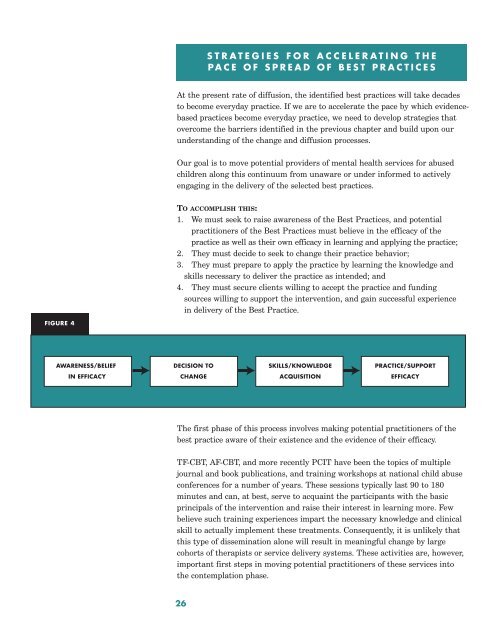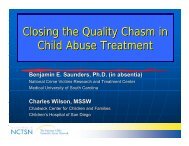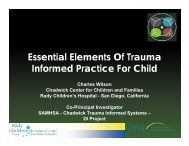Kauffman Best Practices Project Final Report - The Chadwick Center ...
Kauffman Best Practices Project Final Report - The Chadwick Center ...
Kauffman Best Practices Project Final Report - The Chadwick Center ...
Create successful ePaper yourself
Turn your PDF publications into a flip-book with our unique Google optimized e-Paper software.
STRATEGIES FOR ACCELERATING THE<br />
PACE OF SPREAD OF BEST PRACTICES<br />
At the present rate of diffusion, the identified best practices will take decades<br />
to become everyday practice. If we are to accelerate the pace by which evidencebased<br />
practices become everyday practice, we need to develop strategies that<br />
overcome the barriers identified in the previous chapter and build upon our<br />
understanding of the change and diffusion processes.<br />
Our goal is to move potential providers of mental health services for abused<br />
children along this continuum from unaware or under informed to actively<br />
engaging in the delivery of the selected best practices.<br />
TO ACCOMPLISH THIS:<br />
1. We must seek to raise awareness of the <strong>Best</strong> <strong>Practices</strong>, and potential<br />
practitioners of the <strong>Best</strong> <strong>Practices</strong> must believe in the efficacy of the<br />
practice as well as their own efficacy in learning and applying the practice;<br />
2. <strong>The</strong>y must decide to seek to change their practice behavior;<br />
3. <strong>The</strong>y must prepare to apply the practice by learning the knowledge and<br />
skills necessary to deliver the practice as intended; and<br />
4. <strong>The</strong>y must secure clients willing to accept the practice and funding<br />
sources willing to support the intervention, and gain successful experience<br />
in delivery of the <strong>Best</strong> Practice.<br />
FIGURE 4<br />
<strong>The</strong> first phase of this process involves making potential practitioners of the<br />
best practice aware of their existence and the evidence of their efficacy.<br />
TF-CBT, AF-CBT, and more recently PCIT have been the topics of multiple<br />
journal and book publications, and training workshops at national child abuse<br />
conferences for a number of years. <strong>The</strong>se sessions typically last 90 to 180<br />
minutes and can, at best, serve to acquaint the participants with the basic<br />
principals of the intervention and raise their interest in learning more. Few<br />
believe such training experiences impart the necessary knowledge and clinical<br />
skill to actually implement these treatments. Consequently, it is unlikely that<br />
this type of dissemination alone will result in meaningful change by large<br />
cohorts of therapists or service delivery systems. <strong>The</strong>se activities are, however,<br />
important first steps in moving potential practitioners of these services into<br />
the contemplation phase.<br />
26






